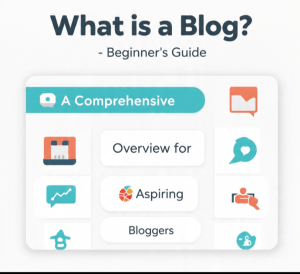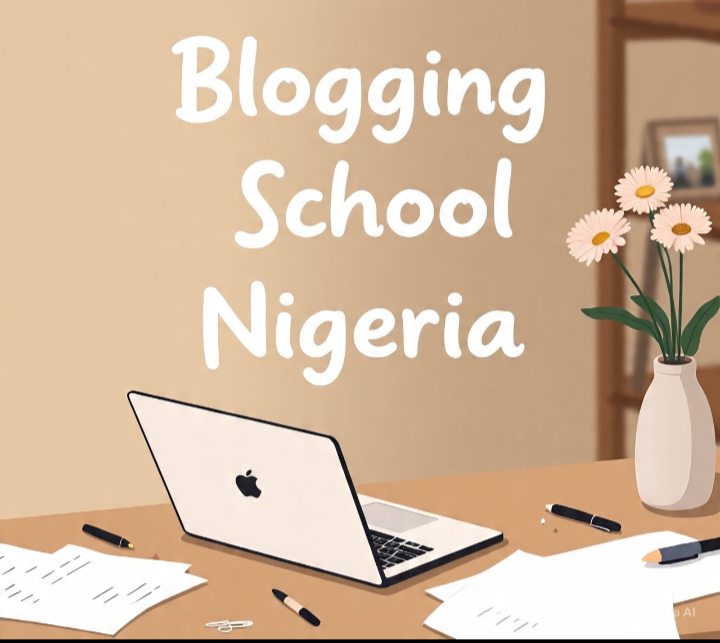What Is a Blog? — Beginner’s Guide
Introduction

In the age of the Internet, having your own voice online isn’t just a luxury—it’s a powerful way to establish authority, share knowledge, and even earn an income. A blog is one of the most accessible ways to do this. Whether you’re someone curious about sharing your experiences, an entrepreneur building a business, or someone trying to earn via AdSense or affiliate marketing, understanding what a blog is and how to run one well is essential.
In this guide, you’ll learn:
Exactly what a blog is (and its history)
The difference between a blog and a regular website
Types of blogs & popular niches
Key components of a blog (technical + content)
How to start a blog (step-by-step)
How blogs make money (monetization)
Best practices for successful, ethical blogging (including things Google/AdSense cares about)
By the end, you’ll have everything you need to confidently launch your own blog and approach monetization in a sound way.
—
What Is a Blog?
Definition
A blog (short for weblog) is an online platform where content is published in discrete entries known as posts, usually displayed in reverse chronological order (newest posts appear first). Bloggers (the people who write them) typically update them periodically—daily, weekly, or whenever they have something relevant to share. Blogs can be personal, professional, hobbyist, business-oriented, or a mix.
Source https://www.hostinger.com/tutorials/what-is-a-blog?
Key features of a blog include:
Regularly updated content (posts)
A specific or broad theme/niche (e.g. tech, personal finance, lifestyle)
Ability for readers to engage (comments, social sharing)
Archival structure so older posts remain accessible (searchable by date, category, tags)
History & Evolution
To outdo competition, understanding how blogging evolved helps with setting expectations:
Blogs first came into existence in the mid-1990s as online diaries or personal journals, where people posted about daily experiences.
Source: https://firstsiteguide.com/what-is-blog
As platforms like Blogger, LiveJournal, and WordPress emerged, blogging became easier for non-technical users.
Over time, blogs shifted from mere personal musings to powerful tools for businesses, brands, educators, and experts. They began to integrate multimedia (images, video, audio), interactive elements (comments, forums, social sharing), and tools for audience engagement.
Monetization entered the picture (ads, sponsored content, affiliate marketing) as people realized blogs could generate revenue. The introduction of Google AdSense in early 2000s was a turning point, because it enabled small bloggers to display relevant ads and earn from clicks or views.
—
Blog vs. Website — What Makes Them Different?
Though blogs are a kind of website, there are key differences:
Feature: Content Frequency
Blog: Updated often (posts)
Regular Website: Static or updated infrequently
Feature: Structure
Blog: Reverse chronological posts; archives, categories, tags
Regular Website: Mostly static pages (Home, About, Services, Contact)
Feature: Tone & Voice
Blog: Often personal, conversational; opinion or advice
Regular Website: More formal, corporate or product-/service-focused
Feature: Engagement
Blog: Comments, social sharing, reader interaction
Regular Website: May have forms/contact, but less day-to-day engagement
Feature: Purpose
Blog: Share ideas, teach, inform, grow audience
Regular Website: Showcase a business/service/product, portfolio, static info
—
Knowing these differences helps you decide what kind of blog you want: personal, professional, business, or blended.
—
Types of Blogs & Popular Niches
Blogs come in many flavours. Choosing a niche early helps you focus, attract a target audience, and monetize faster.
Types of blogs
Personal blogs — your thoughts, lifestyle, diaries
Professional/expert blogs — offering advice in a field (e.g. finance, health, education)
Business blogs / corporate blogs — used by businesses to establish authority, engage customers, increase SEO
Niche blogs — very specific topics like vegan cooking, minimalist living, crypto trading
Authority blogs / multi-author blogs — several contributors, often with high content volume and investment
Microblogs / vlogs / podcasts — shorter posts or media-oriented content (video, audio)
Popular & profitable niches (especially in Nigeria / Africa)
Since your site is Blogging School Nigeria / financialliteracy.com.ng, some niches to consider:
Blogging tutorials & tools
Personal finance & money-management
Digital marketing & SEO
Tech & gadgets (African context)
Agribusiness / food blogs
Health & wellness
Education & e-learning
Lifestyle / travel (if accessible)
A niche that combines blogging + finance or blogging + digital marketing has a lot of potential, because you can teach while also referring tools, hosts, affiliates etc.
—
Key Components of a Good Blog
To stand out and qualify for AdSense, the blog must have certain foundations. Here are the essential technical, content, design & legal components.
Technical Setup
1. Domain & Hosting
Choose a memorable domain name (simple, reflects niche)
Reliable hosting (fast server, good uptime, backups)
2. CMS / Platform
WordPress.org self-hosted is popular because you control content fully
Alternatives: Wix, Ghost, Blogger (less control)
3. Site Structure / Navigation
Clear menu (Home, About, Blog, Contact, Privacy Policy, etc.)
Categories and tags organized logically
Archive pages
4. Mobile Responsive Design
Blog must display properly on phones & tablets
Google counts mobile friendliness as ranking factor
5. Load Speed
Optimized images, caching, minimal plugins
Fast server, good theme
Content Elements
1. High-Quality Writing
Clear, helpful, original content — no plagiarism
Engaging introductions, strong structure (headings, subheadings)
2. SEO Basics
Keyword research
On-page SEO (title tags, meta descriptions, headings, internal links)
Quality outbound & inbound links
3. Multimedia / Visuals
Images, infographics, maybe videos to support content
Use optimized images (size, alt text)
4. User Engagement
Comments section, social share buttons
Option to subscribe via email
Legal & Policy Requirements (important for AdSense)
Privacy Policy page (disclosing data collection, cookies, etc.)
Terms of Service (if needed)
Contact page / clear owner / author bio — transparency matters
Adhering to copyright — no stolen content, no unlicensed media
—
How to Start a Blog — Step by Step
Here’s an actionable path to launching your blog:
1. Pick Your Niche & Target Audience
What are you passionate about? What problems can you help solve? Who is your audience?
2. Choose Domain Name & Hosting
Domain: short, easy to spell & remember, includes relevant keywords if possible
Hosting: decent speed, support, reliable uptime
3. Install & Set Up CMS (WordPress recommended)
Set up basic pages: Home, About, Contact, Privacy Policy
Pick a theme (fast, clean, mobile-friendly)
Install essential plugins (SEO, security, backup, caching)
4. Create Initial Content Strategy
Plan first 10-20 posts around core topics (see earlier content topics)
Include pillar content (in-depth guides) + smaller posts
5. Optimize Each Post for SEO
Keyword research (long-tail keywords, questions people ask)
Use headers (H1, H2, H3), include images with alt text, internal/external links
6. Launch & Promote
Share on social media, forums, relevant communities
Guest posting or collaborations where possible
Build email list from the beginning
7. Monetize When Ready
Apply for Google AdSense, once you have quality content & some steady traffic
Explore affiliate marketing, sponsored posts, selling digital products/services
—
Monetization & How Blogs Make Money
Understanding how revenue works is key if you want transactional intent in your blog (i.e. the blog isn’t just informative, but helps someone take action / spend / invest / buy). Here are monetization methods:
1. Advertising
Google AdSense: shows ads relevant to your content & audience. Requires your site to be policy-compliant, with sufficient content and traffic.
Direct ads / display ads: sell ads space yourself once you get good traffic.
Considering advertising, at financial Literacy Nigeria has a detailed content on HOW TO RUN FACEBOOK ADS in Nigeria, this content will help you to learn on how to run Facebook ads and push traffic to your blog. https://financialliteracy.com.ng/how-to-run-facebook-ads-in-nigeria/
2. Affiliate Marketing
Promote products or services; earn commission on purchases via your affiliate link.
Useful tools in your niche (hosting, WordPress themes/plugins, tools) often have affiliate programs.
3. Sponsored Posts / Brand Collaborations
Brands pay you to write about their product/service (transparently labeled).
Requires you to have some authority and audience.
4. Digital Products / Services
E-books, courses, coaching, templates, tools.
If your blog becomes trusted, people will pay for more structured, premium content.
5. Membership / Subscription
Exclusive content behind a paywall, monthly membership.
Works if you provide value beyond free content.
6. Donations / Patreon
Less common in many niches, but useful if audience values your work and wants to support you.
—
Realities & Timeline: What to Expect
Blogging is not an overnight success. Here are realistic expectations:
It often takes 6-12 months or more of consistent effort before you see meaningful traffic or income.
Quality matters more than quantity. One deeply researched, helpful long post often does better than many short, low-value posts.
SEO and site authority build slowly. Google rewards sites that are trustworthy, consistent, and user-friendly.
—
How to Make Your Blog Qualify for Google AdSense Approval
Since your goal is also to get AdSense approval, here are specific actions to ensure your blog is eligible and remains compliant:
1. Original, High-Quality Content
No copying or spinning other blog content. Each post must add value.
Target at least 20–30 well written posts before applying.
2. Clear Site Structure & Navigation
Menus, categories, tags, archive pages.
About Us, Privacy Policy, Contact Us pages.
3. Adequate Content Length & Depth
Typically, posts with 1,500-2,500+ words tend to perform better (for SEO and ad revenue).
4. Comply with Policies
No adult, illegal, hate, or offensive content.
Disclose affiliate links / sponsored content transparently.
5. Traffic & Engagement
Though AdSense doesn’t require a specific amount of traffic, having some regular visitors, quality user experience, and content updates gives better chances.
6. Good Site Performance
Fast loading speed; mobile friendliness; no broken links.
7. Proper Domains & Ownership
Using your own domain (not subdomains of free hosts) helps.
Show who owns the site (author name, contact email).
—
Actionable Checklist to Get Started Immediately
Here’s a checklist you can follow to move from concept to launch to monetization:
Step What to Do
1 Choose your niche & define your audience.
2 Select domain name & hosting.
3 Install CMS & pick responsive theme.
4 Create essential pages (About, Contact, Privacy).
5 Plan your first 10 blog posts (use keyword research).
6 Write & publish the first few posts; optimize them.
7 Implement social share buttons & email opt-in.
8 Submit your blog to search engines (Google Search Console).
9 Monitor performance (traffic, bounce rate, time on page).
10 Apply for Google AdSense once you meet their policy & quality standards.
—
Frequently Asked Questions About Blogs/Blogging And Answers
Do I need to know how to code to start a blog?
No. Platforms like WordPress make it easy; many themes and plugins reduce the need to code. But basic understanding of things like hosting, domain, and SEO will help.
How often should I publish content?
Consistency is more important than frequency. Starting with 1–2 quality posts per week is fine.
How much does blogging cost?
Costs can vary: domain name (~ yearly fee), hosting, premium theme/plugins, tools for email marketing. But you can start with low cost and scale up.
Can I use free blogging platforms (e.g. Blogger, Wix)?
Yes, but they often come with limitations (less control, restrictions on monetization, branding, or inserting AdSense). Self-hosted WordPress gives more flexibility.
You May Like This: https://blogging.financialliteracy.com.ng/blogging-vs-vlogging-vs-podcasting-which-is-better/
Conclusion
A blog is more than just a place to express yourself—it’s a versatile tool to inform, teach, build trust, grow an audience, and earn income. If you follow the right foundations, create consistent, original content, and stay aligned with best practices (especially AdSense policies), your blog can grow from being just a personal journal into a credible, money-earning platform.
At Blogging School Nigeria, we believe every beginner with passion and persistence can succeed. Use this guide as your foundation. Then keep learning, keep improving, and stay committed. Your first post is just the beginning of many that can take you to your first visitor, first subscriber, and first payout.
